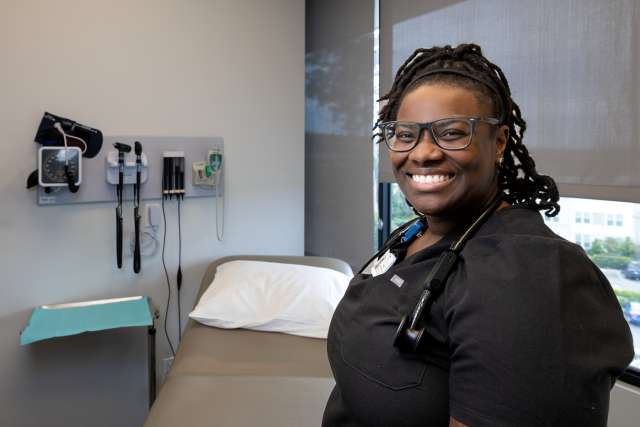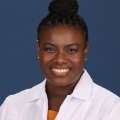The minute Joseph Ramos saw Kimberly Richardson, MD, enter the examination room of the UCLA Health clinic in Torrance, he realized he was in a "safe space."
As a gay man, meeting a primary care physician for the first time had typically been an anxiety-inducing experience for him, Ramos said.
"Because of the social constructs already in place, you are always concerned what your doctor is going to think about you or if they are going to judge you for asking certain questions," he said. "I've had a few awkward experiences in the past."
But, when Dr. Richardson walked in, the first thing he noticed was the pride pin on her coat.
"At that moment, I already knew that I could talk to her about anything," Ramos said.
Ramos found Dr. Richardson through the health system's LGBTQ+ Champions filter, which helps locate physicians who have specialized training and experience caring for LGBTQ+ patients.
The virtually connected network of more than 60 primary and specialty care providers participates in ongoing educational and professional development in LGBTQ+ health topics. These health care workers provide care to UCLA Health patients across the Greater Los Angeles region.
"I knew she was an LGBTQ+ Champion when I scheduled the appointment," Ramos said. "Using that filter and knowing that my doctor was going to have my back and seeing the visual confirmation of that when she walked into the examination room – it was all so comforting and liberating."
Becoming a champion
Dr. Richardson, who is lesbian, said she did not intend to get into LGBTQ+ health care when she began working in internal medicine. That changed in 2020, which turned out to be the deadliest year on record for transgender people in the United States. According to , of the 71 homicides of transgender people in 2019 and 2020, 56 were transgender women of color and 46 were Black transgender women.
After working at the gender health clinic at the University of Kansas for about two years, Dr. Richardson found the UCLA LGBTQ+ Healthcare Fellowship, which trains primary care physicians to develop sensitivity, comfort, clinical knowledge and cultural competency while caring for sexual and gender minority patient populations. Although she applied to the fellowship, her previous experience in gender health led UCLA to hire her full time, according to Amy Weimer, MD, co-director of the UCLA Gender Health program.
While Dr. Richardson sees all patients, she says she takes pride in serving members of a community who continue to be marginalized.
One of the main challenges she faces is making sure everyone who works at the clinic – from the person on the front desk to nurses and other staff – maintains a gender-affirming environment.
"You realize that not everyone around you has had the opportunity to work with transgender patients before," she said. "It's important to understand that when patients hit the front door, that's when the visit starts. If we misgender them there, the visit is over. This is all still new for a lot of staff."
For Juan Avalos, a Licensed Vocational Nurse (LVN) who helps care for Dr. Richardson's patients, it has been a "continuous learning process."
Avalos said he once mistakenly asked a patient about their menstrual status and "they said that doesn't relate to them because they are transgender." Since then, Avalos says he has made it his mission to make sure patients have an experience where they are not just comfortable, but also feel cared for and respected.
"I've learned to slow down and listen," he says. "I've seen how Dr. Richardson interacts with patients in a smooth and pleasant manner. She takes that extra time. Listening is key."
Now, Avalos says, he asks the important questions: What are your pronouns? Are you a person who has periods?
"That can sometimes get uncomfortable for nurses or staff members," he said. "So, I also play a part in educating my co-workers. I can see the results of these efforts. I see how grateful patients are after we changed our approach. They are comfortable and feel like their health care is more accessible."
Boosting representation
Dr. Richardson says there has been some progress, at least when it comes to the medical school curriculum.
"When I was in medical school, we didn't even talk about LGBTQ+ people," she said. "I love that it's getting attention in medical school where students are getting lectures in trans health. It's more open and less hush-hush."
Representation is key, Dr. Richardson says.
"If I have a Black, lesbian female doctor, I would definitely feel better taken care of," she says. "That's because, I would have a doctor who can relate to me at the same societal level. They understand what it's like to be marginalized. They can understand why some people had trouble accepting me when I came out.
“If physicians cannot build a rapport with their patients, there is a wall up. If you can create a space where patients feel safe, they are able to communicate better with their doctor. As physicians, we can do a better job of taking care of them."
Dr. Richardson says she can relate when patients come in facing similar challenges with family members or friends who may struggle to accept who they are.
"I find that I can help them because I've been there," she says. "It's why representation matters so much."
Improving access to care
Dr. Richardson strongly believes that all nationalities, races and sexual orientations need to be well represented in the medical community so patients are comfortable and have the choice of seeing who they want to see. Oftentimes, representation is not just a matter of inclusion, but also "a health care access issue," she says.
"If I wasn't here to represent certain groups, some people might never go to a doctor," she says. "It's not just about how much money you have or what type of insurance coverage you have. It's about a certain comfort level that could make the difference to a person seeking or not seeking care.”
Her patient, Ramos, agrees. He said he had no problem asking Dr. Richardson for PrEP (pre-exposure prophylaxis), a medication for those who are HIV-1 negative that helps prevent transmission of the virus through sexual intercourse.
“I wanted the medication so I can have an active sex life, but at the same time, be responsible and take control of my health,” he said.
For Ramos, Pride Month means “taking pride in ourselves and making our health a priority.”
“I finally have a doctor who is on my side and that’s a big deal,” he says. “I feel fortunate that UCLA Health is creating a space where I can talk to a provider who is willing to help, and who is interested in my perspective and my unique health issues.
“It just puts you at ease.”




